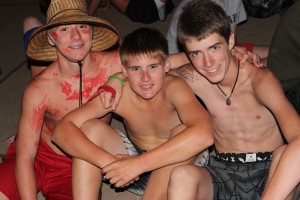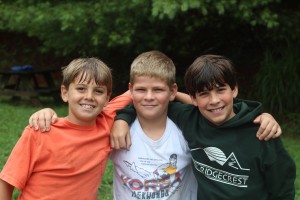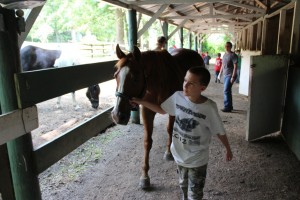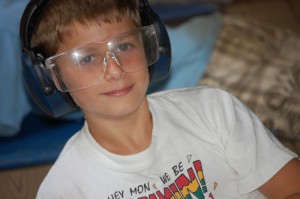Why Kids Flourish at Camp
Posted by Phil Campers often describe camp as their “happy place”” or “the best two weeks” of their year. And, from my own observation, I’ve seen that kids and the counselors who work with them are obviously happy at camp. They smile a lot. They look relaxed. There’s a lot of laughter. So many fun things happen at camp every day that it’s no surprise it’s such a happy place for kids.
Campers often describe camp as their “happy place”” or “the best two weeks” of their year. And, from my own observation, I’ve seen that kids and the counselors who work with them are obviously happy at camp. They smile a lot. They look relaxed. There’s a lot of laughter. So many fun things happen at camp every day that it’s no surprise it’s such a happy place for kids.
Recently I’ve read several books about the science behind happiness and the research that’s being done to determine the specific elements that cause people to “flourish” in life. (See my reading list below.)
Traditionally, psychologists have focused on studying psychological diseases – depression, anxiety, eating disorders, etc. – and their cures. But led by Martin Seligman (University of Pennsylvania), a new breed of psychologists called Positive Psychologists have, for the past decade, been studying the positive side of people. They ask not what is wrong with people, but what is right. They research what makes us do well in life and the reasons why some people thrive and find success and happiness in life.
Originally, Seligman had a theory of “happiness” outlined in his book Authentic Happiness, but he moved away from only using the word “happiness” to a new theory that focuses instead on well-being or “flourishing.” Seligman determined that it’s inaccurate to use the term “happiness,” as some people simply don’t have the personality to appear outwardly happy to others, even when they are doing quite well in life. I’m an extrovert who smiles a lot, so, objectively, people would probably say I’m pretty high on the happy scale. But how do we account for an introvert who doesn’t show a lot or emotion or display the outward symptoms that we equate with happiness? He may not smile a lot or appear outwardly happy, but, Seligman contends, he could still be flourishing. So, instead of using a one-dimensional definition that’s dependent on momentary emotions and personality traits, Seligman developed a more thorough theory of well-being that moved beyond his original happiness theory.
Seligman’s uses the acronym PERMA to define his theory and the five measurable elements he has determined lead to well-being. As I read about each pillar of PERMA in Seligman’s book, Flourish: A Visionary New Understanding of Happiness and Well-being, I kept having “ah-ha” moments. “This happens at camp!” I would think. “And this, too!” In fact, as I read, I determined that ALL of the elements of flourishing that Seligman describes happen at camp. According to Seligman, “No one element defines well-being, but each contributes to it.”
I’ve always been sucked in by inspirational quotes and quick sounds bites about how camp contributes to happiness, but I love knowing the science behind why kids flourish at camp.
PERMA at Camp… Read more… from Sunshine Parenting…
Posted in Just For Parents | Tagged Camp Crestridge, Camp Ridgecrest, parent articles, parent resources, parenting, Ridgecrest Summer Camps, summer camp | Leave a reply
Do Your Kids Know the Gospel?
Posted by Phil One of the hidden treasures that the “Prince of Preachers,” Charles Spurgeon, left the church was a little book titled Come Ye Children. In it, Spurgeon contended earnestly that one of the most important tasks given to a parent, teacher, or minister is teaching kids the gospel. Spurgeon writes:
One of the hidden treasures that the “Prince of Preachers,” Charles Spurgeon, left the church was a little book titled Come Ye Children. In it, Spurgeon contended earnestly that one of the most important tasks given to a parent, teacher, or minister is teaching kids the gospel. Spurgeon writes:
There must be doctrine, solid, sound, gospel doctrine to constitute real feeding. When you have a joint on the table, then ring the dinner-bell; but the bell feeds nobody if no provender is served up. Getting children to meet in the morning and the afternoon is a waste of their steps and yours if you do not set before them soul-saving, soul sustaining truth. Feed the lambs; you need not pipe to them, nor put garlands round their necks; but do feed them.
As a parent, teacher, or minister, teaching your kids the gospel is the most important task you have. So, what is your plan? Just like kids grow physically in proportion to the food they eat and emotional support they receive, they grow spiritually in a similar manner. Are you intentionally feeding your kids the gospel? It is estimated that pastors have 104 hours a year with kids in their ministry, while parents have 8,736 hours a year.
By the end of 2014, will your kids know the gospel?
Continue Reading more from Ed Stetzer…
Posted in Just For Parents | Tagged Camp Crestridge, Camp Ridgecrest, christian parents, ed stetzer, kids ministry, parenting, raising boys, Ridgecrest Summer Camps, the gospel | Leave a reply
My Daughter Went Away to Camp and Changed
Posted by PhilWhen I look at my phone, I see my daughter leaving for camp on my home screen. She stands at the bottom of an airport escalator, an orange backpack over her shoulder. She’d cut her long, strawberry blond hair the day before, so the person smiling from under the carrot top doesn’t look familiar. But the image of a kid who just needs a backpack and a ticket is one I recognize. Some parents may have to nudge their children to camp. For the last two summers, our daughter has run out the door. “Yukon ho!” she yelled when leaving this year, an expression she learned from Calvin and Hobbes‘ main character Calvin, whom she now resembles.
I hadn’t been at the National Airport departure gate for her first trip as an Unaccompanied Minor. I was in the stands at my son’s baseball tournament. For pickup my wife and I flipped the load-sharing. She did baseball duty, and I flew to Minnesota, driving almost four hours to a packed-dirt road lined with birch trees that ended at the shores of Lake Pokegama: Camp Mishawaka. Thirty-six years earlier, I had been the 9-year-old flying alone from Washington to this place with a new haircut.
When I was at camp, my parents didn’t know what was happening to me. We weren’t allowed to use the telephone, so even on my birthday I just received word that they’d called to wish me a happy one. All they got on their end was a handful of sentences written in loopy script with scattershot spelling. Technology makes hovering easier now. For the last few weeks, my wife and I ended our days poking around on the camp website, scanning photographs for the flash of red hair among the campers playing capture the flag and canoeing. Now, as I stood on the soft grass at the edge of the compound, I was doing the same scan, watching my daughter fling herself around along with the other campers, passing time before the organizing ring of the dinner bell.
Posted in Just For Parents | Tagged Camp Crestirdge, Camp Parents, Camp Ridgecrest, parent articles, parenting, raising boys, summer camp | Leave a reply
The Secret to Raising Emotionally Healthy Kids
Posted by Phil
Some interesting thoughts from Tim Elmore…
Yesterday, I shared with the Huffington Post community the following thoughts that I wanted to share with you as well…
We live in complex times. As I work with thousands of parents and faculty each year, I’m increasingly convinced we have a more engaged set of adults who care about kids today than at any time since I began my career in 1979. Simultaneously, however, I am observing a more troubled population of kids, especially by the time they reach their teen years. It appears at first like an oxymoron. How can such a cared-for generation experience such emotional difficulties?
Today, more kids struggle with depression and anxiety than at any time in modern times. In The Price of Privilege, Dr. Madeline Levine argues America’s newly-defined at-risk group is preteens and teens from affluent, well-educated families. In spite of their economic and social advantages, they experience the highest rates of depression, substance abuse, anxiety disorders and unhappiness of any group of children in this country. Adolescent suicide has quadrupled since 1950.
Diagnosing the Emotional Health Problem in Many Kids Today
As I speak to psychologists and career counselors, I’ve begun to hear a term over and over, as they describe the emotional state of young people. This term appears to be a paradox, but it aptly defines perhaps millions of adolescents in America:
“High Arrogance, Low Self-esteem”
How can someone be cocky, yet not have a healthy sense of identity? Consider the reality they face. In a recent undergraduate survey, Dr. Art Levine reports that grade inflation has skyrocketed. In 1969, only 7 percent of students said their grade point average was an A- or higher. In 2009, it was 41 percent. In that same time period, students having a C average dropped from 25% to 5%. But with grade inflation at an all-time high, it’s surprising to note that 60 percent of students believe their grades understate the true quality of their work. They believe they deserve a higher mark. One has to wonder — are kids that much smarter than forty years ago, or do we just give them higher grades to keep the customer? The fact is, while student scores continue to decline when compared to other nations, the one statistic that remains constant is that our kids continue to assume they’re awesome.
Sheltered by parents, teachers and coaches who fear that unhappy kids are a poor reflection on them, we have rewarded them quickly, easily and repeatedly. Kids naturally begin believing they are amazing. Case in point: My son recently took part in a theatre arts competition. Parents paid dearly to enable their kid to get on stage, and now I know why. Every single student got a medal, just for showing up. When they performed, they received extra medals. The medal levels were: gold, high gold and platinum. (Did you notice that gold was the lowest award possible?) Here’s the clincher. If your kid didn’t get the award he wanted, trophies were on sale after the competition. This is not uncommon. Kids today have received trophies for ninth place in Little League baseball. They get fourth-runner up medals at competitions. Ribbons and stars are given out routinely. Of course they are arrogant. With little effort, they’ve been awarded a prize.
The problem is, as they age, they begin to suspect this affirmation is skewed. In fact, mom may be the only one telling them they’re “special” or amazing. By college, kids meet all kinds of other “special” students, who are as smart or athletic as they are. Between the ages of 17-24, kids now experience their first real “failure.” They bump up against hardship and difficulty and often aren’t resilient enough to bounce back. Truth be told, when a kid has been told they are “excellent” without working hard or truly adding value to a team, it rings hollow to them. We must realize that our affirmation must match their performance. Low self-esteem hits them at this point (often their freshmen or sophomore year in college) because they suddenly recognize their esteem may be built on a foundation of sand.
Solving the Emotional Health Problem in Many Kids Today
My point is not to suggest your child isn’t special in his own right. My point is that this is only part of the story. In preparing our young people for adulthood, we must give them a sense of the big picture. We must drip doses of reality with all the praise. When I see troubled kids from upper-middle class homes, it makes me wonder:
• Question: Are they fragile because they’ve been sheltered?
• Question: Are they unmotivated because they’ve been praised too quickly?
• Question: Do they get anxious or fearful because they’ve never taken risks?
• Question: Are they self-absorbed because they’ve been rewarded so often?
• Question: Do they move back home after college because they’re ill-prepared?
I believe two sets of messages must be communicated to students during the first two decades of their life. Sadly, very often only one set of messages gets through. The first ten years, we must communicate childhood messages. If we have done this well, they are prepared for necessary adolescent messages that prepare them for a challenging adult world:
Childhood Messages
1.You are loved.
2. You are unique.
3. You have gifts
4. You are safe.
5. You are valuable.
Adolescent Messages
1. Life is difficult.
2. You are not in control.
3. You are not that important.
4. You are going to die.
5. Your life is not about you.
I recognize this may sound harsh, but I find myself having to communicate the second set of messages far too often to a college student. If we love these students, we will relay both messages. They deserve the truth from us and they deserve a childhood that prepares them for the life that awaits them as adults. Whether they are emotionally ready as they enter adult life… will be up to us.

Want to learn more about how to raise emotionally healthy kids? Bring home a copy of Artificial Maturity to drill deeper.
Posted in Just For Parents | Tagged Camp Crestridge, Camp Ridgecrest, parenting, Parenting Teenagers, Ridgecrest Summer Camps | Leave a reply
Top Priority: Remembering Your Spouse
Posted by Phil “…When we were dating, it was very easy to make our relationship my number one priority, second only to God. I would anxiously await the mail every Tuesday because I would get letters or cards letting me know that I was being thought of. The weekends were spent hanging out with my now-husband and his best friend. We would rollerblade, go to the park, and spend time at the beach…building memories to last a lifetime. …
“…When we were dating, it was very easy to make our relationship my number one priority, second only to God. I would anxiously await the mail every Tuesday because I would get letters or cards letting me know that I was being thought of. The weekends were spent hanging out with my now-husband and his best friend. We would rollerblade, go to the park, and spend time at the beach…building memories to last a lifetime. …
Then we got married…first one, then two, and then three kids came. Work got busier, schedules filled up, and then we added the kids’ activities too…well, I don’t need to remind anyone about how crazy life can get. And, even though my husband is still the most important person to me besides God, I don’t always do such a great job showing him that. By the time the kids’ problems are resolved, laundry and other chores are completed, dinner cleaned up – where is there any time to make the one I love feel special? ”
Read more…. at Crosswalk.com
Posted in Just For Parents | Tagged Camp Crestridge, Camp Ridgecrest, marriage, parenting, Ridgecrest Summer Camps | Leave a reply
Baby Sitters and Body Guards
Posted by PhilWhat do the following positions have in common?
Babysitter.
Body Guard.
Manager.
Safety Net.
Advisor.
If you’re a parent, you’ve held them all or you will by the time your children dive from the nest. One day they will pay for their own phone lines and car insurance, schedule their own dentist appointments, drive through and pay for their own take-out, and do laundry in their own dorm rooms or apartments.
Read more …. from crosswalk.com
Posted in Just For Parents | Tagged Camp Crestridge, Camp Ridgecrest, parenting, Ridgecrest Summer Camps | Leave a reply
How Your Teen is Wired
Posted by Phil Parents,
Parents,
Here are some tangible ideas to help you connect with your teen… Don’t try to make the conversation too serious. Enjoy this article from Focus on the Family by Joe White, Larry Weeden
Is your teen on the track to a meaningful future? Are you finding out what a joy it can be to help make the most of how God has wired him or her?
Many of us want to help our teens dream big, fulfilling, God-honoring dreams. But how do we do that?
The first step is to understand the great experiment known as your teen. In all of human history, there’s never been another person with your teen’s exact mix of God-given personality, talents, interests and spiritual gifts. As the two of you get to know that unique wiring through self-tests like the ones in the book Wired by God, you’ll start to see which kinds of dreams might make a good fit.
Your Teen’s Basic Bent
Here are some questions you can use anytime to find out how God has wired your young person:
- “What really drives you?”
- “What’s the most fun you’ve ever had helping someone else?”
- “What dreams do you think God has given you?”
- “What can you do that most people can’t?”
- “What ability would you most like to develop? Why?”
- “If God hired you for a summer job, what would you hope it would be? Why?”
And this one from Doug Fields, a youth pastor: “If you could design a specific way to serve God and knew you wouldn’t fail, what would you do?”
Remember that your purpose is to listen and learn, to better understand and appreciate your teen’s uniqueness. This is not the time for lectures and advice. Figuratively speaking, you need to have big ears and a small mouth, tough skin and a tender heart.
Another way to learn by questioning is to talk with others in your teen’s life: teachers, youth group leaders, coaches, school counselors, Scout leaders, Sunday school teachers, parents of close friends. Ask what they’ve observed about your child’s likes and dislikes, interests and passions, abilities and aptitudes.
Often these people will confirm your own observations. Sometimes, though, they’ll describe a side of your teen that you hadn’t noticed — or offer an insight you’d overlooked.
Your Teen’s Interests and Passions
Here’s a way to help your teen pinpoint his or her interests and natural abilities. It’s based on “The Vision Quest,” a tool developed by Tim Sanford, a counselor at Focus on the Family who works with a lot of young people.
Give your teen these instructions:
On a piece of paper, list the things you’ve done since the fourth grade. We’re talking about academics, sports, social events, the arts, student government, hobbies, interaction with family and friends, personal adventures, youth activities, socials, special events, camps, worship, leadership, volunteer work, mission trips, “helping out,” clubs, service projects, job duties, volunteer or assigned tasks, and chores.
You don’t have to compile your whole list at once. Allow two or three weeks, adding to it as new memories come to mind. If you don’t know whether to include something in the list, go ahead and put it down anyway.
Now give each activity a “positive” or a “negative” rating. How did it turn out? How did it affect you?
After several days, pull your worksheet out and think again about the events to which you gave a negative value. Look for patterns. For example, if events connected with mechanical things (fixing the car, building something, helping with props at the school play) consistently ended in disaster, you’re probably not the mechanical type.
Now move to the positive side of the worksheet. Ask yourself the questions below as you look over those events.
- “Is there a pattern or anything these events have in common?”
- “Are some of the activities things I’d like to pursue more?”
- “How can I begin doing more of these kinds of activities?”
- “What kinds of qualities, talents, character traits and skills do these activities require?”
- “Do I have some of those qualities and traits?”
- “Are any circumstances or events missing from my worksheet? If so, what are they, and why might they be missing?”
- “Are there any activities I’ve never done before, but I’d like to try?”
Posted in Just For Parents | Tagged Camp Crestridge, Camp Ridgecrest, Focus on the Family, parenting, Ridgecrest Summer Camps | Leave a reply
Good Advice
Posted by Phil My church is going through some “aging” pains… sometimes I feel like I’m one of the “young people” at the church, and at the age of 56, that’s not a good thing! Our church has a lot of older folks, and then, surprisingly, a good sized youth group. That’s because our youth pastor has made a concerted effort to reach out to young people in the community, engage them in their faith, and get them plugged into our church community. For most of them, it is sad that their parents don’t come as well. Yet the teenagers continue to come, despite the lack of modeling by the parents.
My church is going through some “aging” pains… sometimes I feel like I’m one of the “young people” at the church, and at the age of 56, that’s not a good thing! Our church has a lot of older folks, and then, surprisingly, a good sized youth group. That’s because our youth pastor has made a concerted effort to reach out to young people in the community, engage them in their faith, and get them plugged into our church community. For most of them, it is sad that their parents don’t come as well. Yet the teenagers continue to come, despite the lack of modeling by the parents.
While church by itself is not the point, it seems clear that God has chosen to use the local church to consistently draw both children and parents to His side.
I am thankful that I had parents that made me go to church, and they went as well. There were many Sundays during my childhood that I wanted to stay home and watch cartoons, or sleep late, or do anything but go to church. But our family was consistently there every Sunday, and it was a priority in our family. Because of that modeling by my parents, I went to church enough to learn about a Savior that changed my life!
If your family has made it a priority to be in church on Sunday mornings, then God bless you, and I’m sure he does! If your family is like so many families today that try to get to church every now and then, then I would encourage you to consider making church going a priority in the life of your family. Parenting, and raising children is a daunting challenge if faced alone. We pray that your family would find a community of believers that wants to pursue our God together… Proverbs 22:6 says “Train up a child in the way he should go; even when he is old he will not depart from it.” Good advice… God bless!
Ron Springs
Camps Director
Posted in Just For Parents | Tagged Camp Ridgecrest, Just for Parents, parent resourses, parenting, Parenting Teenagers, Ridgecrest Summer Camps, Ron Springs | Leave a reply
99 Thoughts on Parenting Teenagers
Posted by Phil At Ridgecrest Summer Camps, we know that being a parent isn’t always straight forward. As you do your best to raise your campers, we want to supply you with a wide variety of resources. With that in mind, check out this book… The Truth on Raising Teenagers From Parents Who Have Been There by Walt Mueller
At Ridgecrest Summer Camps, we know that being a parent isn’t always straight forward. As you do your best to raise your campers, we want to supply you with a wide variety of resources. With that in mind, check out this book… The Truth on Raising Teenagers From Parents Who Have Been There by Walt Mueller
If you’re the parent of a teenager, you need all the help you can get. How do you help your children make wise choices? How do you give your teenagers freedom to make their own choices while still providing a guiding hand? How do you invest your time and energy in ways that make an eternal difference in your children’s lives?
Walt Mueller delivers the goods in 99 Thoughts for Parents of Teenagers, a no-holds-barred look at the good, bad, and ugly aspects of parenting teenagers. Drawing on his experience as a parent of four children who have passed through their teenage years, Walt shares wisdom, thoughts, insights, and suggestions for making the teenage years count.
If you’re a parent, you’ll want to read, devour, and absorb the dynamic truths in this book. And if you’re a youth worker, you’ll want to get this book into the hands of parents in your ministry to guide them, encourage them, and give them insights on fulfilling God’s great call to raise children who pursue a Jesus-centered life.
Click here to download an excerpt.
…Center for Parent Youth Understanding.
Posted in Just For Parents | Tagged Camp Crestridge, Camp Ridgecrest, parent resourses, parenting, Parenting Teenagers, Ridgecrest Summer Camps | Leave a reply
Parenting the Introverted Child
Posted by Phil When discussing their introverted child, I ask a difficult question to the parents: “Are you disturbed (perhaps, even ashamed) that your child is an introvert?”
When discussing their introverted child, I ask a difficult question to the parents: “Are you disturbed (perhaps, even ashamed) that your child is an introvert?”
This is a crucial question for two reasons. First, whenever you focus too much attention on what you believe to be a problem, you can lose focus on your child. Children are too important to get lost in the search to solve problems. Second, if you are ashamed of your child’s introversion, it is difficult to support him as he discovers his place in the world. If you secretly hope your child will be something he never was designed to be, how can you promote his own self-discovery and success?
Posted in Just For Parents | Tagged Camp Crestridge, Camp Ridgecrest, introvert, introverted children, parent resourses, parenting, ParentLife, Ridgecrest Summer Camps | Leave a reply

